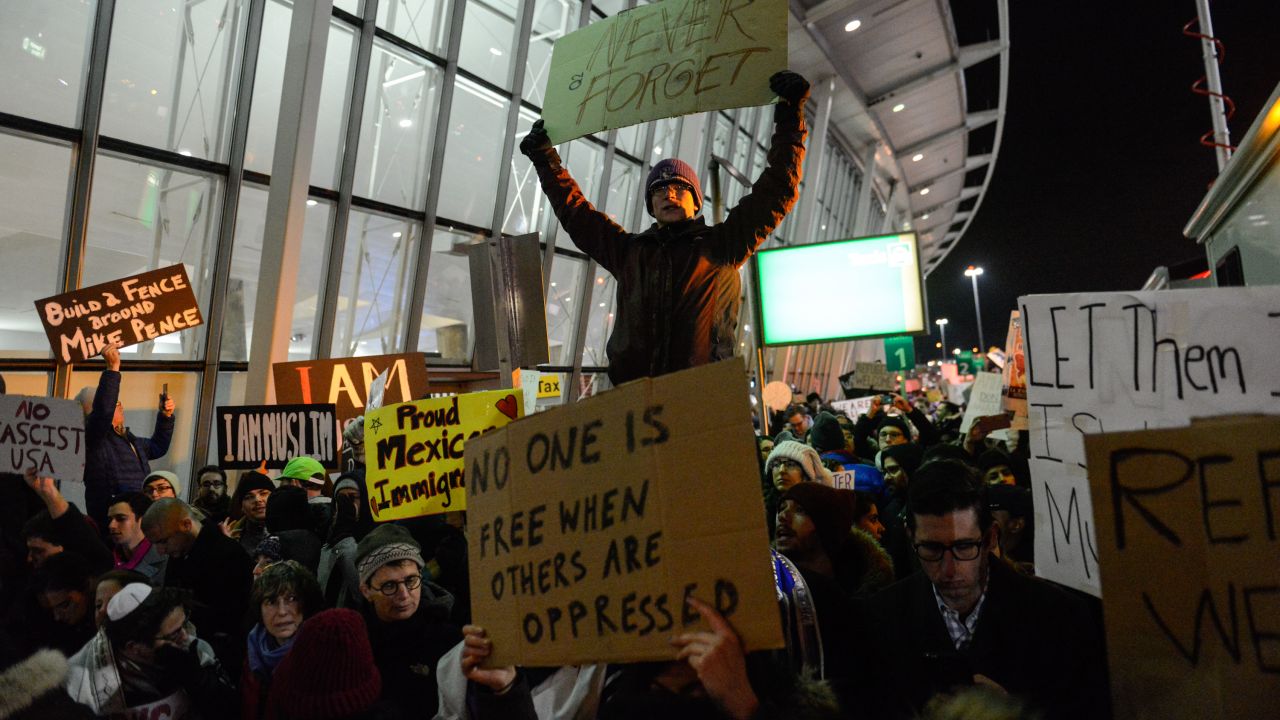
Protestors rally during a demonstration against the new immigration ban issued by President Donald Trump at John F. Kennedy International Airport on Jan.y 28, 2017 in New York City. (Photo by Stephanie Keith/Getty Images)
This post originally appeared on the website of the Brennan Center for Justice.
Our democracy depends on courts upholding constitutional values and government officials enforcing court orders. The judiciary’s rapid response to Friday’s executive order — which instituted travel restrictions for refugees from anywhere in the world and immigrants from seven Muslim majority countries — illustrates the core role our courts play in reviewing the constitutionality of executive action. The reported failures of government officials in complying with court orders are a reminder that the rule of law is fragile.
The consequences of Friday’s executive order were immediate and widespread. Its broad language, somewhat narrowed by the White House since the order was signed, meant that hundreds of individuals — including those with student visas, work visas and green cards — were immediately denied access to or removed from flights, held in United States airports upon arrival and even deported. Over the weekend, lawyers flooded airports across the country and filed emergency petitions challenging the executive order’s constitutionality and seeking judicial relief for their clients.
Judges responded within hours of the filings. So far, five federal district courts have issued orders temporarily staying portions of the executive order. While government officials and lawyers representing the detainees disagree about the scope of the orders, the Eastern District of New York’s pronouncement has the clearest application nationwide.
New York (JFK): The first stay order came Saturday evening from the Eastern District of New York, which blocked the removal of two Iraqi immigrants from John F. Kennedy International Airport, as well as all otherwise lawful visa and green card holders nationwide.
Virginia (Dulles): A stay order from the Eastern District of Virginia on Saturday prohibited federal officials from removing lawful permanent residents from Dulles International Airport and ordered them to allow detained permanent residents access to attorneys.
Massachusetts (Logan): The most sweeping of the orders came early Sunday morning from the District of Massachusetts, which prohibited not only deportation under the executive order, but also detention. The order also limited the scope of secondary security screenings.
Washington (SEA-TAC): The Western District of Washington issued an order Sunday staying the deportation of two individuals detained at the Seattle-Tacoma International Airport.
California (LAX): While one detainee’s petition for a temporary stay of removal was pending with the Central District of California, he was placed on a flight from Los Angeles International Airport to Dubai to be removed to Iran. On Sunday, the court ordered that he be permitted to return, transported back to the United States, and that officers in Dubai be informed of the order.
In addition, US District Judge Andre Birotte Jr., a federal judge in Los Angeles, issued a temporary restraining order against the ban on Tuesday night.
These orders are a good example of the role of courts in our political system. When executive action is challenged for contravening a constitutional command or prohibition, the judiciary must assess those claims. And it is the judiciary’s job to intervene regardless of elected officials’ political motivations or voters’ wants. In the words of retired Supreme Court Justice Sandra Day O’Connor, our courts are the place where, in our tripartite system of government, “being right is more important than being popular or powerful, and where fairness trumps strength.”
While a politician is expected to seek policy outcomes consistent with her constituents’ interests, a judge, as the late Justice Antonin Scalia observed, “represents the law.” Policies based on hatred or fear may, at times, please the public, but it is the role of courts to act as a check on those that are unlawful.
Just as it is the responsibility of our courts to apply the law to the facts of the cases before them, it is the obligation of federal and state officials to follow and enforce court orders. Judicial power is unique. Alexander Hamilton explained that the judiciary, unlike the executive and legislative branches, “has no influence over either the sword or the purse,” deriving its power instead from the public’s respect for its decisions and officials’ compliance with them.
Troubling evidence of federal officials disobeying court orders accumulated over the weekend. The most flagrant disregard for a court order unfolded at Dulles. Despite the Eastern District of Virginia’s order early Sunday morning granting attorneys for legal permanent residents access to their clients, Customs and Border Protection officials reportedly continuously denied attorneys access. A number of reports of customs officials trying to coerce detainees to board return flights and waive their legal status have also emerged. Lawyers for detainees are compiling records of noncompliance to present to the governing courts.
Intentionally violating a court order is deeply corrosive to democracy. In the days ahead, it is imperative that all constitutional actors affirm their commitment to the rule of law. Anything else threatens the very core of our system of government.
Editors Note: You can track all cases related to Trump’s immigration and refugee executive orders at the University of Michigan Law School’s Civil Rights Litigation Clearinghouse.




